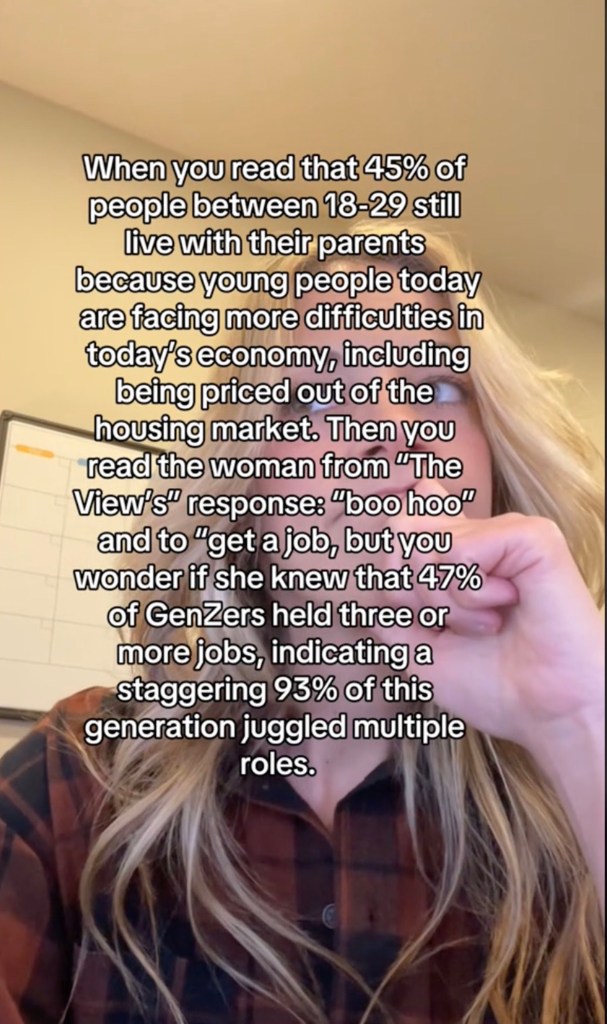Gen Z, millennials rebrand side hustles as ‘poly-work’ amid struggle to make ends meet
They’re only monogamous to the money.
In a brutal economy that’s made some Americans feel as if they’re in a financial headlock over the past few years, younger 9-to-5ers have had to become creative when it comes to making their coins.
Although Gen Z and millennials have been socially stereotyped as “entitled” demographics with weak work ethics, it seems the 20- and 30-somethings in the workforce are now leading the buzzy “poly-employment” trend.
“Welcome to the age of polyworking, led by Gen Z in response to the rising U.S. inflation and living costs,” penned a disgruntled blond in the TikTok caption of a viral clip dedicated to the movement — which, conceptually, is not all that new.
In fact, terms like “ploy-work” and “poly-employment,” are just expressions that folks under 40 are using to describe having multiple jobs at once.
@midcontinentfunding That wasn’t very nice Joy. Welcome to the age of polyworking, led by GenZ in response to the rising U.S. inflation and living costs. #mortgage #homeownership #genz #money
♬ suono originale – Michela Miele
The use of the prefix “poly,” meaning many, is a cheeky nod to the rising popularity of polyamory — the practice of being ethically engaged in romantic relationships with more than one partner.
“To counter the escalating cost of living, a growing percentage of workers are engaging in multiple job roles,” announced a recent report via workforce management company Deputy. “It’s leading to the emergence of poly-employment as a notable trend.”
And according to experts, the young-adult swing toward securing several streams of income is rooted in a distrust of the workplace.
@natehoskin Is “polyworking” some new phenomenon or are we just not able to have the financial flexibility we want/need from working a single job anymore? #genzlife #babyboomer #quietquitting #polywork #finlit #financialliteracy #financialfreedom Hoskin Capital is a registered investment adviser. This platform is solely for informational purposes and is not offering advisory services or sales of securities. Investing involves risk and possible loss of principal capital. Comments by viewers and/or recognitions are no guarantee of future investment outcomes and do not ensure that a viewer will experience a higher level of performance or results. Public comments posted on this site are not selected, amended, deleted, or sorted in any way. If applicable, certain editing of personal identifiable information and misinformation may be deleted.
♬ original sound – Nate Hoskin, CFP®, AWMA

“Gen Z and millennials … don’t see job security in the way former generations did,” Silvija Martincevic, CEO of Deputy, told Fast Company.
“They don’t see employer loyalty in the same way,” she continued. “So they prioritize financial security over tying themselves up to one employer.”
Per a recent survey of 120,000 shift workers commissioned by the imprint, one in five Gen Z workers engage in poly-employment. Researchers, too, determined that 60% of poly-employed workers are young women who largely work in either hospitality, health care or the retail and service industries.

The report also noted that the number of “poly-employed shift workers” more than doubled from 2021 to 2023.
The findings align with a January report from the Bureau of Labor Statistics on the post-COVID pandemic spike of multiple jobholders in the US. In December 2023, about 8,565,000 Americans held at least two jobs, and of that number, a staggering 399,000 sought full-time employment at both their primary and secondary posts.
Mackenzie Moan, a married mom of two, went viral in November after revealing that despite holding two full-time jobs, her family struggles to make ends meet. Other more tech-savvy laborers have resorted to secretly tapping ChatGPT to fulfill a few daily work duties as they juggle multiple jobs.
And though the “poly-employment” movement sounds like a hip way to make bank — some, like NYC poly-worker Taylor Caraway, have virally noted the benefits of having multiple jobs — most Gen Zers aren’t thrilled about having to work themselves silly to survive.
“Is ‘polyworking’ some new phenomenon?” questioned finance content creator Nate Hoskin in a satirical TikTok post related to the trend.
“Or are we just not able to have the financial flexibility we want/need from working a single job anymore?”







